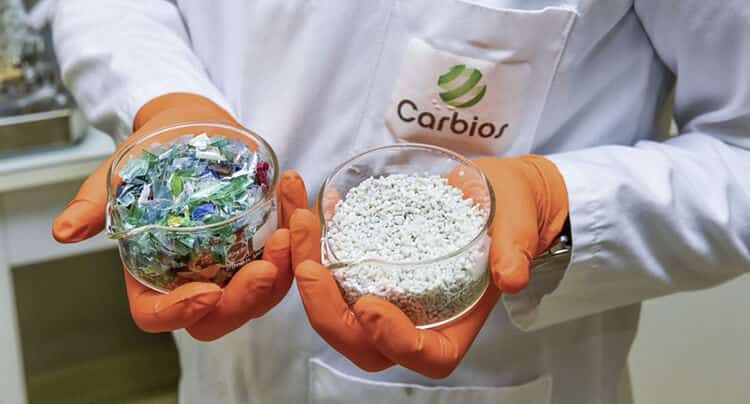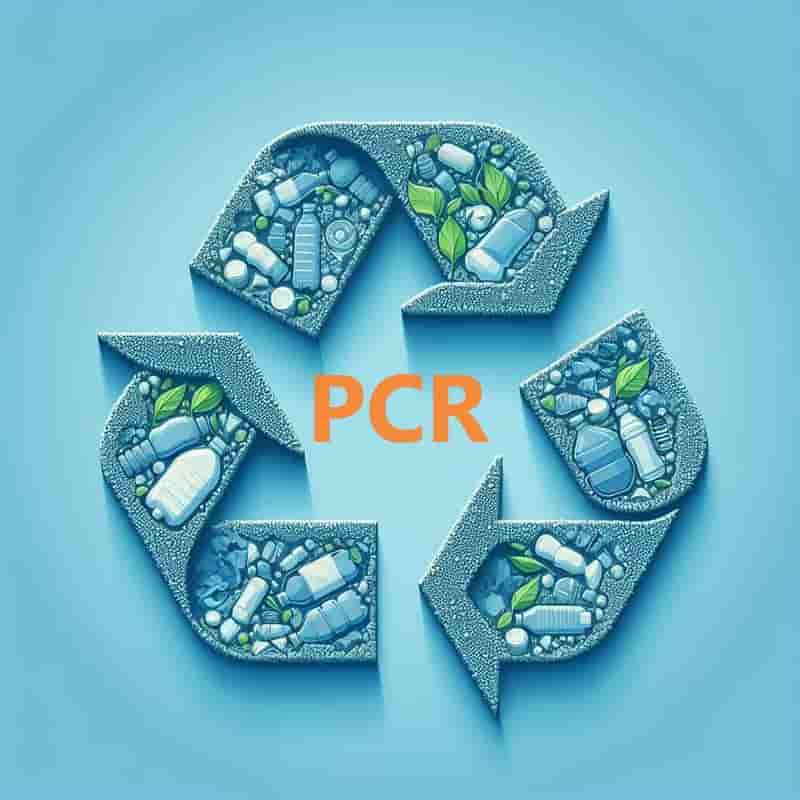Chemical Recycling
PET Resin – Bioplastics as toxic as regular plastics; both need regulation, say researchers
More…

Crude Oil Prices Trend

Crude Oil Prices Trend by Polyestertime
Europeans throw away 7 million tonnes of clothes a year: Czechia is making recycling compulsory
EU countries generated an estimated 6.95 million tonnes of textile waste in 2020 or around 16kg annually per person.
We’ve all seen the mountains of old clothes that end up as giant landfill sites in low income countries. Now, Czechia is leading Europe in tackling rather than contributing to the problem. Chemical Recycling
Around 180,000 tonnes of textiles are discarded in Czechia each year with just 3 to 4 per cent making its way into mixed waste bins. 39,000 tonnes are sorted for recycling whereas non-recyclable contaminated in mixed bins amounts to 75,000 tonnes.
The country has a plan, however, to revamp its current waste management practices. In December last year the Ministry of the Environment announced plans to enforce compulsory textile waste collection from 2025. At the moment, separate textile waste collection isn’t mandatory meaning a lot of discarded clothes which could be reused or recycled end up in landfill. Chemical Recycling
It aims to align the country with the European directive on waste management, according to Minister Petr Hladík. He emphasised that the goal is to ensure more textiles are recycled and increase the efficiency of recycling efforts.
More…

French companies develop PET bottle made from enzymatic recycling
L’Occitane en Provence, Carbios and Pinard Beauty Pack partnered to create a 100 percent biorecycled transparent bottle.
Carbios, a France-based company that uses biological technologies to recycle plastic and textiles, and international cosmetics brand L’Occitane en Provence, also based in France, have partnered to develop a transparent polyethylene terephthalate (PET) bottle made entirely from enzymatic recycling for a shower oil from the Amande range.
In collaboration with converter Pinard Beauty Pack, the companies say the bottle exemplifies a shared desire to build an efficient European recycling sector to accelerate the transition to a circular economy for plastic and meet brands’ commitments for more sustainable packaging solutions. Chemical Recycling
The bottle will be on display at Carbios’ Stand D02 at “Edition Spéciale” by LuxePack, the trade show dedicated to sustainable premium packaging, taking place June 4-5 at the Carreau du Temple in Paris.
According to Carbios, the PET bottle was made via its enzymatic depolymerization process and with a European value chain committed to responsible consumption of sustainable materials. The bottle’s production began with the local supply of PET scrap that had already been collected, sorted and prepared and was sent to Carbios’ industrial demonstrator in Clermont-Ferrand, France. The material consisted of colored bottles, multilayer trays and mechanical recycling residues. Chemical Recycling
More…

SK Chemicals’ Breakthrough Circular Recycling Technology Gains Recognition in Europe
SK Chemicals’ groundbreaking circular recycling technology has gained significant recognition in Europe. The company, led by CEO Ahn Jae-hyun, presented at the Plastic Industry & Environment Congress 2024 in Douai, France, from May 22-23.
Organized by the French Society of Plastics Engineers (SFIP), this annual congress gathers plastic material producers, manufacturers, recycling companies, and brand owners to discuss circular economy solutions. Leading chemical companies like EASTMAN, SABIC, and SK Chemicals showcased their technologies. Chemical Recycling
Although SK Chemicals established its European subsidiary in 2008, this was its first official presentation at a plastic association event, highlighting its recent focus on the recycling business amid growing EU regulatory interest.
On the first day, SK Chemicals, alongside European client Albis, showcased its superior circular recycling technology. Unlike physical recycling, which degrades quality, SK Chemicals’ chemical recycling breaks down plastic at the molecular level, allowing infinite reuse without quality loss. Chemical Recycling
In March, SK Chemicals acquired chemical recycling assets from Chinese green materials specialist Shuye for approximately 130 billion won, forming SK Shantou. This acquisition included the world’s first commercialized polyester chemical recycling facilities.

New microreactors and flow loops improve asphaltene management
Asphaltenes are an ultra-complex fraction of crude petroleum that comprise a diverse population of molecules that vary in size, solubilities, aggregation states and hetero-atom contents. Asphaltene buildup and deposits create many operational and safety issues, and can occur anywhere in crude-oil production systems where favorable conditions exist. Despite their prevalence in the oil-and-gas industry, much is still misunderstood about asphaltene chemistry and control. Chemical Recycling
A new research initiative launched by ChampionX (The Woodlands, Tex.; www.championx.com) is designing new testing and evaluation methods to create more effective chemical formulations for asphaltene control that can be easily transferred from the laboratory to the field. “We are developing better methods that narrow the gap between asphaltene-control chemical performance in the laboratory and performance in field applications. By adopting better crude-oil storage and handling for asphaltene-control testing, the chemical development and qualification process can be improved substantially,” says Chris Russell, corporate scientist at ChampionX.
To tackle these concerns, the team developed a high-pressure, high-temperature flow loop where asphaltenic crude oil is subjected to field-relevant temperature and pressure conditions in the presence of heptane or propane. Chemical Recycling
More…

Sabic’s versatile Ultem™ resins, on display at aix 2024, support recycling and sustainability goals
• At AIX 2024, SABIC is showcasing its diverse portfolio of ULTEM materials that can replace traditional thermosets and promote design freedom, processing ease and sustainability.
• ULTEM resins are adaptable for use in many different formats, processing methods and applications.
• These resins enhance sustainability by offering opportunities for mono-material designs and replacing fossil-based grades with equivalent certified renewable grades.
SABIC, a global leader in the chemical industry, is highlighting its broad and diverse portfolio of ULTEM™ materials at the 2024 Aircraft Interiors Expo (AIX). ULTEM resin, a polyetherimide (PEI), is adaptable to a wide range of formats, including foam, sheet, fiber, powder, and composite and honeycomb structures. Chemical Recycling
Due to their versatility and desirable attributes, these resins offer the industry a smooth transition path from traditional thermosets to lighter, more environmentally cautious and more easily processed thermoplastics.
At its exhibit (Stand #6C51B), the company is displaying aircraft applications that benefit from a variety of ULTEM materials, including interior parts, seating, lighting, structural elements, electrical components and composites. Chemical Recycling
To address the industry’s sustainability goals, SABIC is showing how these different ULTEM material formats support mono-material designs that may simplify recycling.
More…

Plastics Recycling Faces Change And Innovation
From chemical processing of recycling plastics to eliminating single-use plastics to developing biodegradable polymers, the plastic recycling industry is facing continuous change and innovation. While progress is being made, the recycling rate of post-consumer plastic (or lack thereof) is startling. The Department of Energy released a study in 2022 that analyzed plastic recycling data and it found that only five percent of plastics are recycled, which matched a report by Beyond Plastics and the Last Beach Cleanup that indicated the recycling rate for post-consumer plastic was just five to six percent in 2021. While plastics recycling is on the decline, the per capita generation of plastic waste has increased by 263 percent since 1980. Chemical Recycling
The scale and impact of plastic pollution on the environment and human well-being has now been widely recognized. “‘Recycling’ as sub-category to the broader theme of ‘sustainable polymer engineering’ has become the topic of national academic center-scale research efforts and focus of industrial efforts,” said Michael Bockstaller professor, Materials Science and Engineering, Carnegie Mellon University College of Engineering. “The vision of a circular polymer economy has become more realistic. Chemical Recycling
More…

Bio-degradable Plastics – Bio-based and Biodegradable Plastics Industries in China Policy framework, market trends, technologies and outlook for PLA, PA, PHA and PBAT Hürth, 28 May 2024: The new report by nova-Institute presents a timely market analysis of China’s bio[1]based and biodegradable plastics industries and markets in 2024 01-06-2024
Chemical Recycling








